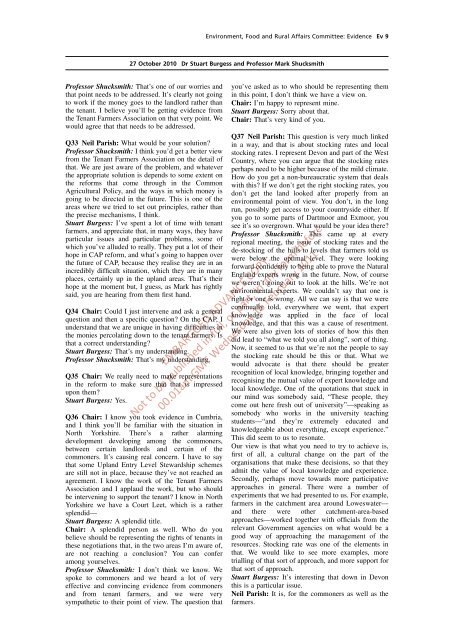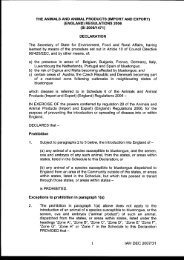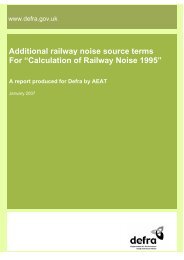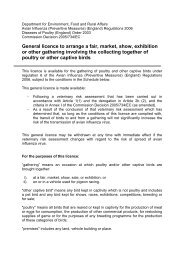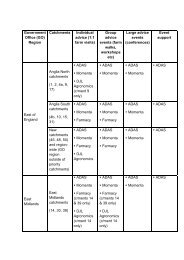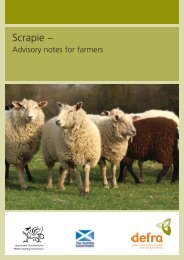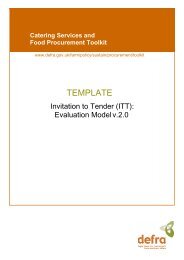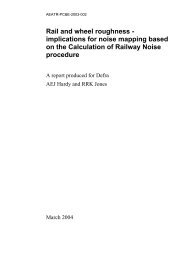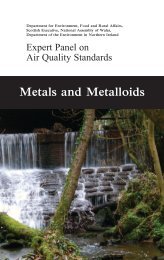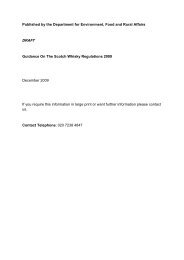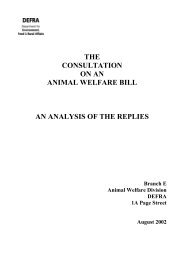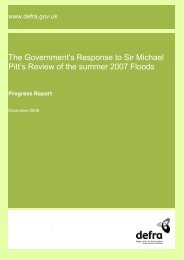Farming in the Uplands - ARCHIVE: Defra
Farming in the Uplands - ARCHIVE: Defra
Farming in the Uplands - ARCHIVE: Defra
Create successful ePaper yourself
Turn your PDF publications into a flip-book with our unique Google optimized e-Paper software.
Environment, Food and Rural Affairs Committee: Evidence Ev 9<br />
27 October 2010 Dr Stuart Burgess and Professor Mark Shucksmith<br />
Professor Shucksmith: That’s one of our worries and<br />
that po<strong>in</strong>t needs to be addressed. It’s clearly not go<strong>in</strong>g<br />
to work if <strong>the</strong> money goes to <strong>the</strong> landlord ra<strong>the</strong>r than<br />
<strong>the</strong> tenant. I believe you’ll be gett<strong>in</strong>g evidence from<br />
<strong>the</strong> Tenant Farmers Association on that very po<strong>in</strong>t. We<br />
would agree that that needs to be addressed.<br />
Q33 Neil Parish: What would be your solution?<br />
Professor Shucksmith: I th<strong>in</strong>k you’d get a better view<br />
from <strong>the</strong> Tenant Farmers Association on <strong>the</strong> detail of<br />
that. We are just aware of <strong>the</strong> problem, and whatever<br />
<strong>the</strong> appropriate solution is depends to some extent on<br />
<strong>the</strong> reforms that come through <strong>in</strong> <strong>the</strong> Common<br />
Agricultural Policy, and <strong>the</strong> ways <strong>in</strong> which money is<br />
go<strong>in</strong>g to be directed <strong>in</strong> <strong>the</strong> future. This is one of <strong>the</strong><br />
areas where we tried to set out pr<strong>in</strong>ciples, ra<strong>the</strong>r than<br />
<strong>the</strong> precise mechanisms, I th<strong>in</strong>k.<br />
Stuart Burgess: I’ve spent a lot of time with tenant<br />
farmers, and appreciate that, <strong>in</strong> many ways, <strong>the</strong>y have<br />
particular issues and particular problems, some of<br />
which you’ve alluded to really. They put a lot of <strong>the</strong>ir<br />
hope <strong>in</strong> CAP reform, and what’s go<strong>in</strong>g to happen over<br />
<strong>the</strong> future of CAP, because <strong>the</strong>y realise <strong>the</strong>y are <strong>in</strong> an<br />
<strong>in</strong>credibly difficult situation, which <strong>the</strong>y are <strong>in</strong> many<br />
places, certa<strong>in</strong>ly up <strong>in</strong> <strong>the</strong> upland areas. That’s <strong>the</strong>ir<br />
hope at <strong>the</strong> moment but, I guess, as Mark has rightly<br />
said, you are hear<strong>in</strong>g from <strong>the</strong>m first hand.<br />
Q34 Chair: Could I just <strong>in</strong>tervene and ask a general<br />
question and <strong>the</strong>n a specific question? On <strong>the</strong> CAP, I<br />
understand that we are unique <strong>in</strong> hav<strong>in</strong>g difficulties <strong>in</strong><br />
<strong>the</strong> monies percolat<strong>in</strong>g down to <strong>the</strong> tenant farmers. Is<br />
that a correct understand<strong>in</strong>g?<br />
Stuart Burgess: That’s my understand<strong>in</strong>g.<br />
Professor Shucksmith: That’s my understand<strong>in</strong>g.<br />
Q35 Chair: We really need to make representations<br />
<strong>in</strong> <strong>the</strong> reform to make sure that that is impressed<br />
upon <strong>the</strong>m?<br />
Stuart Burgess: Yes.<br />
Q36 Chair: I know you took evidence <strong>in</strong> Cumbria,<br />
and I th<strong>in</strong>k you’ll be familiar with <strong>the</strong> situation <strong>in</strong><br />
North Yorkshire. There’s a ra<strong>the</strong>r alarm<strong>in</strong>g<br />
development develop<strong>in</strong>g among <strong>the</strong> commoners,<br />
between certa<strong>in</strong> landlords and certa<strong>in</strong> of <strong>the</strong><br />
commoners. It’s caus<strong>in</strong>g real concern. I have to say<br />
that some Upland Entry Level Stewardship schemes<br />
are still not <strong>in</strong> place, because <strong>the</strong>y’ve not reached an<br />
agreement. I know <strong>the</strong> work of <strong>the</strong> Tenant Farmers<br />
Association and I applaud <strong>the</strong> work, but who should<br />
be <strong>in</strong>terven<strong>in</strong>g to support <strong>the</strong> tenant? I know <strong>in</strong> North<br />
Yorkshire we have a Court Leet, which is a ra<strong>the</strong>r<br />
splendid—<br />
Stuart Burgess: A splendid title.<br />
Chair: A splendid person as well. Who do you<br />
believe should be represent<strong>in</strong>g <strong>the</strong> rights of tenants <strong>in</strong><br />
<strong>the</strong>se negotiations that, <strong>in</strong> <strong>the</strong> two areas I’m aware of,<br />
are not reach<strong>in</strong>g a conclusion? You can confer<br />
among yourselves.<br />
Professor Shucksmith: I don’t th<strong>in</strong>k we know. We<br />
spoke to commoners and we heard a lot of very<br />
effective and conv<strong>in</strong>c<strong>in</strong>g evidence from commoners<br />
and from tenant farmers, and we were very<br />
sympa<strong>the</strong>tic to <strong>the</strong>ir po<strong>in</strong>t of view. The question that<br />
you’ve asked as to who should be represent<strong>in</strong>g <strong>the</strong>m<br />
<strong>in</strong> this po<strong>in</strong>t, I don’t th<strong>in</strong>k we have a view on.<br />
Chair: I’m happy to represent m<strong>in</strong>e.<br />
Stuart Burgess: Sorry about that.<br />
Chair: That’s very k<strong>in</strong>d of you.<br />
Q37 Neil Parish: This question is very much l<strong>in</strong>ked<br />
<strong>in</strong> a way, and that is about stock<strong>in</strong>g rates and local<br />
stock<strong>in</strong>g rates. I represent Devon and part of <strong>the</strong> West<br />
Country, where you can argue that <strong>the</strong> stock<strong>in</strong>g rates<br />
perhaps need to be higher because of <strong>the</strong> mild climate.<br />
How do you get a non-bureaucratic system that deals<br />
with this? If we don’t get <strong>the</strong> right stock<strong>in</strong>g rates, you<br />
don’t get <strong>the</strong> land looked after properly from an<br />
environmental po<strong>in</strong>t of view. You don’t, <strong>in</strong> <strong>the</strong> long<br />
run, possibly get access to your countryside ei<strong>the</strong>r. If<br />
you go to some parts of Dartmoor and Exmoor, you<br />
see it’s so overgrown. What would be your idea <strong>the</strong>re?<br />
Professor Shucksmith: This came up at every<br />
regional meet<strong>in</strong>g, <strong>the</strong> issue of stock<strong>in</strong>g rates and <strong>the</strong><br />
de-stock<strong>in</strong>g of <strong>the</strong> hills to levels that farmers told us<br />
were below <strong>the</strong> optimal level. They were look<strong>in</strong>g<br />
forward confidently to be<strong>in</strong>g able to prove <strong>the</strong> Natural<br />
England experts wrong <strong>in</strong> <strong>the</strong> future. Now, of course<br />
we weren’t go<strong>in</strong>g out to look at <strong>the</strong> hills. We’re not<br />
environmental experts. We couldn’t say that one is<br />
right or one is wrong. All we can say is that we were<br />
cont<strong>in</strong>ually told, everywhere we went, that expert<br />
knowledge was applied <strong>in</strong> <strong>the</strong> face of local<br />
knowledge, and that this was a cause of resentment.<br />
We were also given lots of stories of how this <strong>the</strong>n<br />
did lead to “what we told you all along”, sort of th<strong>in</strong>g.<br />
Now, it seemed to us that we’re not <strong>the</strong> people to say<br />
<strong>the</strong> stock<strong>in</strong>g rate should be this or that. What we<br />
would advocate is that <strong>the</strong>re should be greater<br />
recognition of local knowledge, br<strong>in</strong>g<strong>in</strong>g toge<strong>the</strong>r and<br />
recognis<strong>in</strong>g <strong>the</strong> mutual value of expert knowledge and<br />
local knowledge. One of <strong>the</strong> quotations that stuck <strong>in</strong><br />
our m<strong>in</strong>d was somebody said, “These people, <strong>the</strong>y<br />
come out here fresh out of university”—speak<strong>in</strong>g as<br />
somebody who works <strong>in</strong> <strong>the</strong> university teach<strong>in</strong>g<br />
students—“and <strong>the</strong>y’re extremely educated and<br />
knowledgeable about everyth<strong>in</strong>g, except experience.”<br />
This did seem to us to resonate.<br />
Our view is that what you need to try to achieve is,<br />
first of all, a cultural change on <strong>the</strong> part of <strong>the</strong><br />
organisations that make <strong>the</strong>se decisions, so that <strong>the</strong>y<br />
admit <strong>the</strong> value of local knowledge and experience.<br />
Secondly, perhaps move towards more participative<br />
approaches <strong>in</strong> general. There were a number of<br />
experiments that we had presented to us. For example,<br />
farmers <strong>in</strong> <strong>the</strong> catchment area around Loweswater—<br />
and <strong>the</strong>re were o<strong>the</strong>r catchment-area-based<br />
approaches—worked toge<strong>the</strong>r with officials from <strong>the</strong><br />
relevant Government agencies on what would be a<br />
good way of approach<strong>in</strong>g <strong>the</strong> management of <strong>the</strong><br />
resources. Stock<strong>in</strong>g rate was one of <strong>the</strong> elements <strong>in</strong><br />
that. We would like to see more examples, more<br />
triall<strong>in</strong>g of that sort of approach, and more support for<br />
that sort of approach.<br />
Stuart Burgess: It’s <strong>in</strong>terest<strong>in</strong>g that down <strong>in</strong> Devon<br />
this is a particular issue.<br />
Neil Parish: It is, for <strong>the</strong> commoners as well as <strong>the</strong><br />
farmers.<br />
EMBARGOED ADVANCE COPY:<br />
Not to be published <strong>in</strong> full, or part, <strong>in</strong> any form before<br />
00.01am GMT Wednesday 16 February 2011


